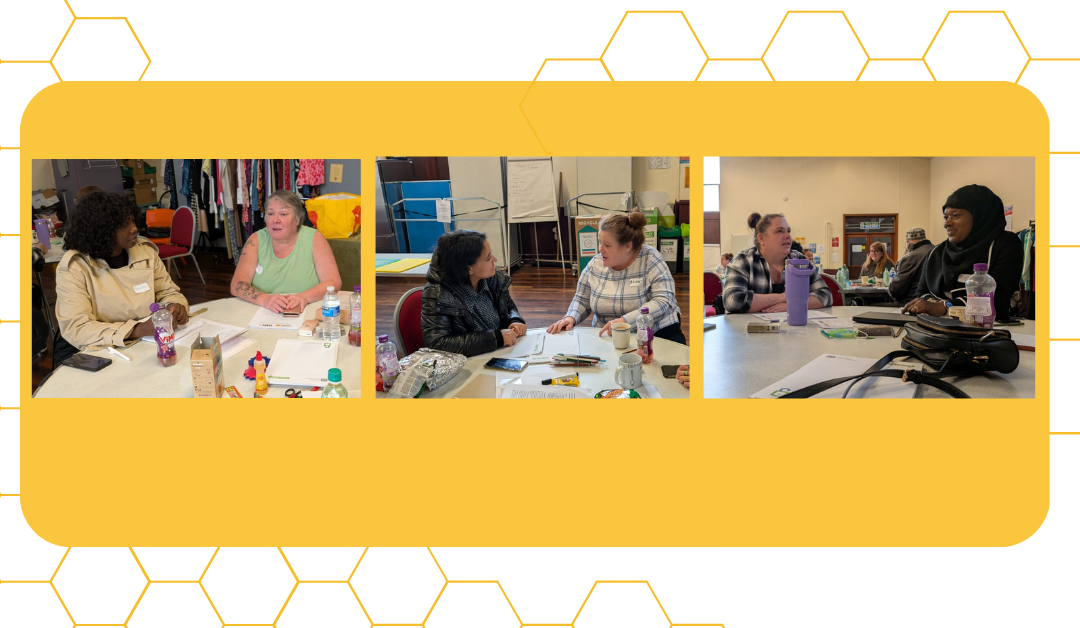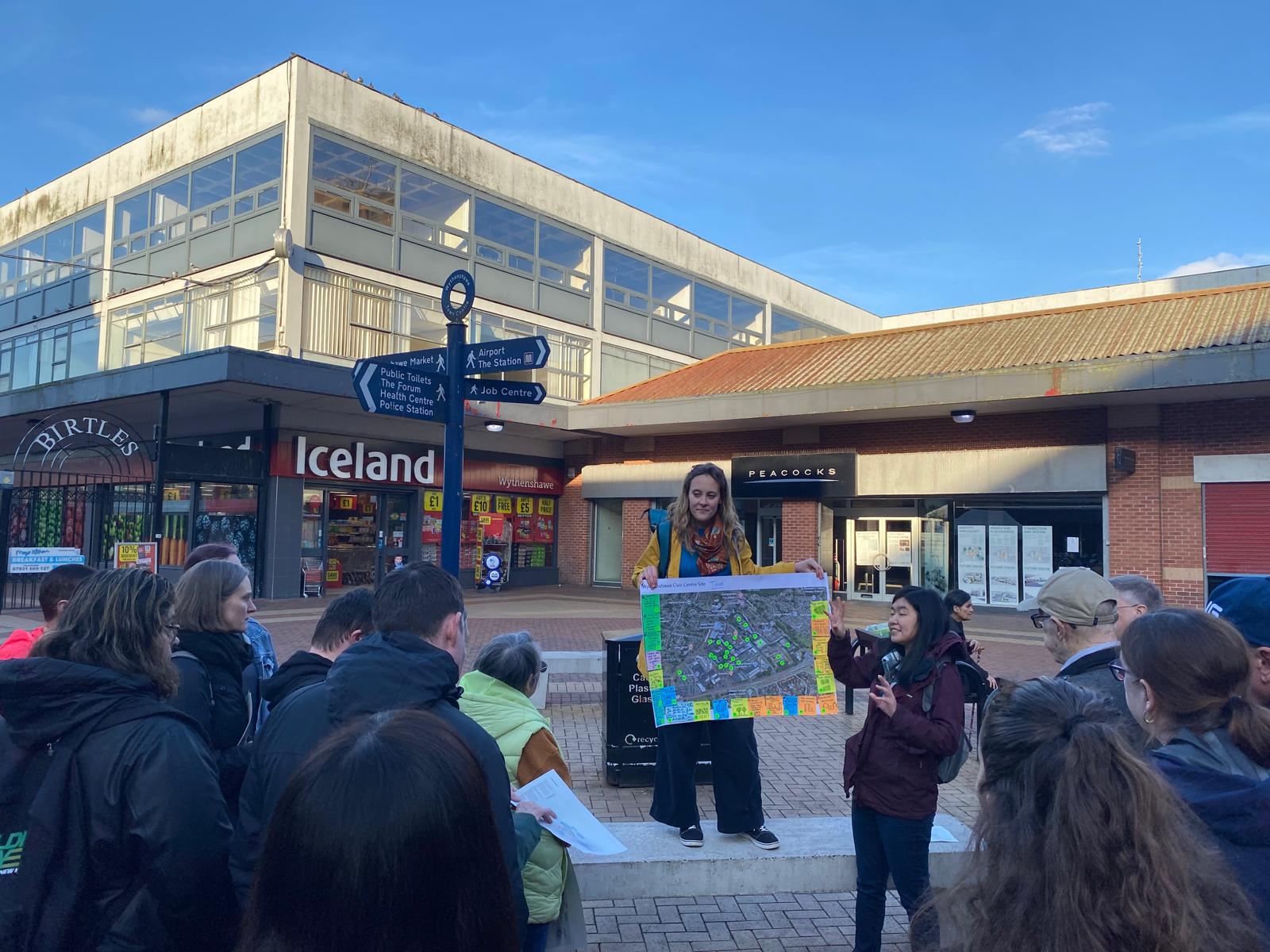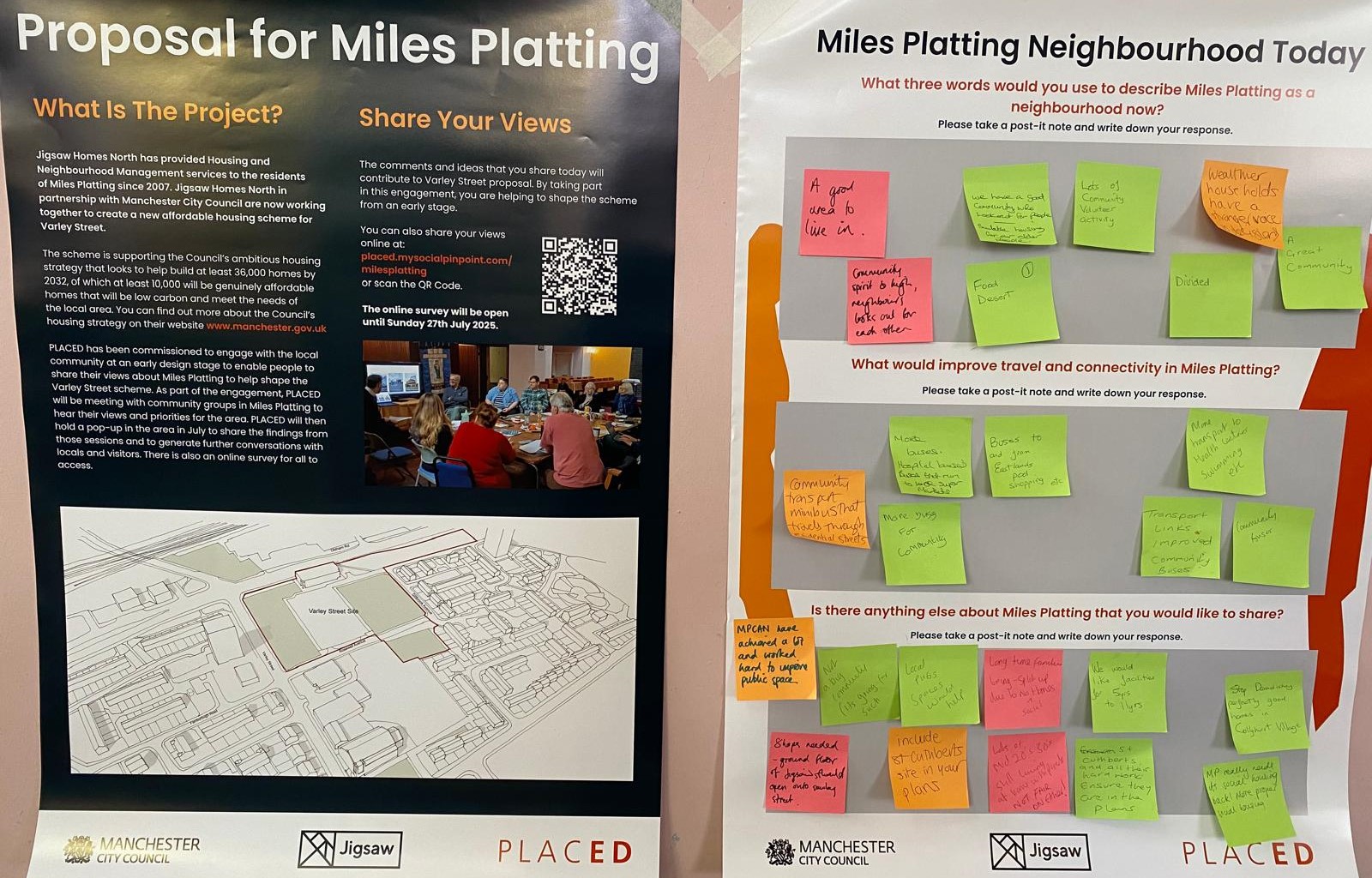Meredith Matters!

That Meredith matters and Meredith people matter is a thread that ran through all the work we have undertaken.
The idea that tenants can design research and evaluate their own issues and have the knowledge to solve them came from the work undertaken at Hopton Court where we used evidence from OUR own research to make dramatic changes in the block.
This was with CLASS/Community Savers, One Manchester and the University.
What we are trying to achieve is a NORC: a naturally occurring retirement community. This model was applied in Canada and New York where tower block tenants came together to make change.
There is something different about living in tower blocks. It’s more confined, more isolating, and evidence shows we are more likely to have physical and mental health issues. As the tower blocks in Hulme are in the inner city, Hulme has high pollution, and we live in a two tier system with the ever expanding university buildings and sharing scarce resources with a huge student population.
But as we are all Hulmites, we will not go quietly into the night. We are made of stronger stuff. Built through a lifetime of adversity.
Meredith people didn’t disappoint.
We began our work in autumn 2023 with support from Turn2Us and carried out the research in May/June 2024. We looked at access to social care and financial impacts of the care system. From the evidence gathered at Meredith, there were there 3 themes that emerged: the cost of living, health inequalities and social isolation. Issues that we will now work towards changing.

The experience of working with Meredith tenants was amazing. By being a Tenant myself, I was able to understand a lot of what the tenants talked about. This research was different to others, where it would be a professional coming to you with their own agenda and questions.
This works because we know our own. We know it’s more important to show respect and empathy. We know that tenants are more than a sum total of their problems. We also know their potential and their abilities. We know we are more than a box that some smart arsed professional puts us in.
That’s why it works through one cup of tea at time. Through building trust and having local knowledge.

It was amazing to see that change can happen quickly. Having the GP on site and a Money Mentor meant people accessed services they were finding hard to reach. Instantly benefits were applied for, and someone was able to see the doctor after suffering for years with a long term health condition.
Meredith is a culturally diverse community which brings amazing knowledge and different solutions to problems.
It’s been an absolute honour to work with Meredith. I can see already the shoots of change. I have already hear the stories, laughter, and a community determined to make change for all the residents in the block.
Big up Meredith! Our journey now begins.
Blog by Tina Cribbin, Hulme tenant and member of the Meredith Matters project team
Spotlight on Miles Platting Savers
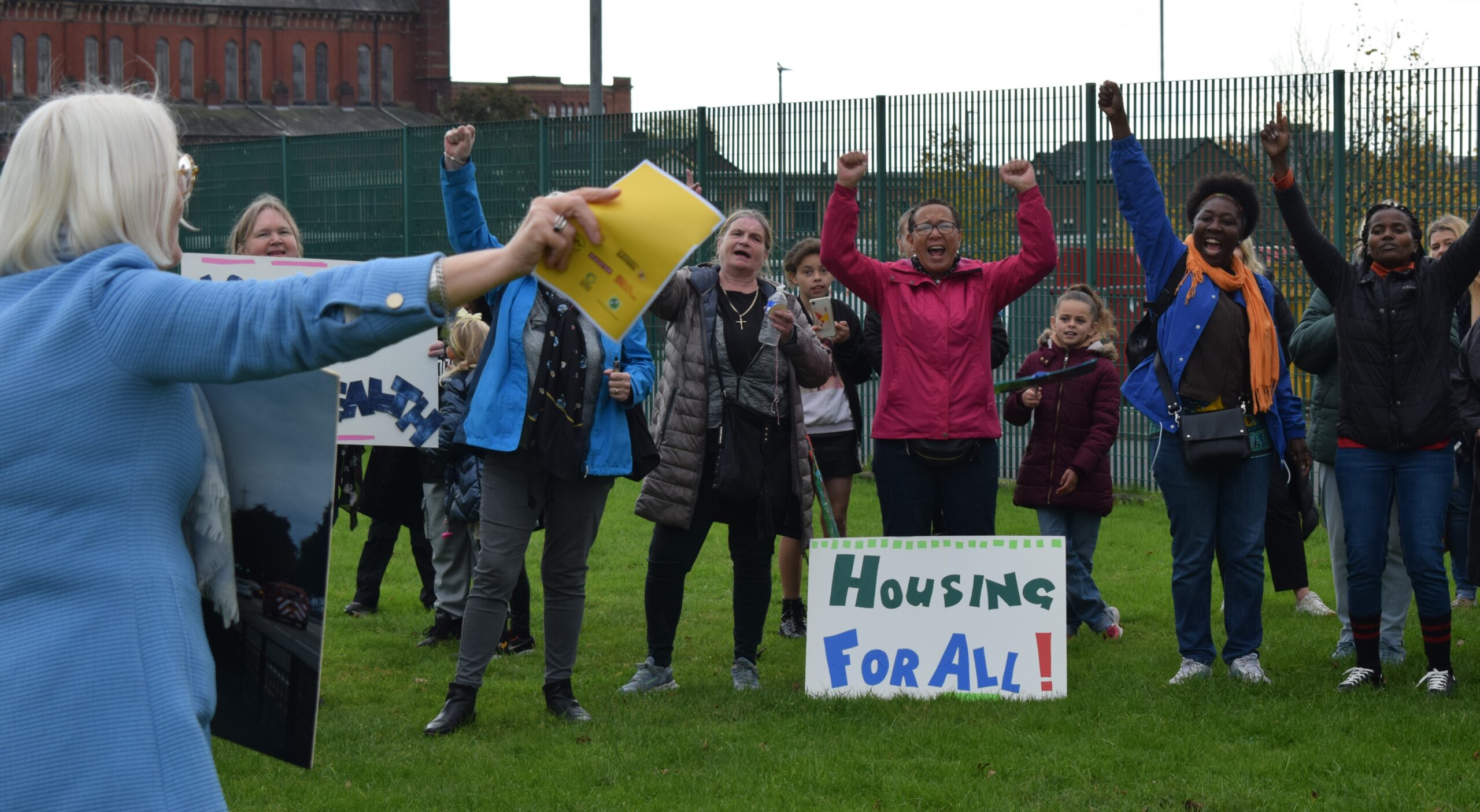
Read our interview with Dot, Committee Member at Miles Platting Savers, find out about one of the original groups in the Savers Network that is still going strong!

Can you tell us a bit about Miles Platting Savers? When did you start, where and how
often do you meet? How many members do you have?
About 5 years, we meet once a week at the coffee morning at the Church of the Apostles in
Miles Platting. We have about about 20 regulars and 30 savers in the group. We have a mixture of people who come to coffee morning, young and old.
As a group, what would you say are the main benefits for the individuals who save with
you?
It gives them a bit of extra cash to buy stuff they need, people are saving for uniforms,
Christmas and even holidays. I think most of the time you’re saving for something you think you
can’t have, then you realise if you save a little bit you can. There’s definitely a social side to it.
Most people are part of the coffee and some are visiting the social supermarket and they are
savers too. We definitely go in, have a cup of tea and have a chin wag and a catch up.
Has working with the other groups helped Miles Platting Savers to develop, learn, expand
or do things differently?
I think so, we see how other groups do theirs and then think if it works for us we can have a go.
I think it helps just to talk about what other groups are doing.
As well as the savings group, are Miles Platting Savers involved in any other community
projects and what are the impact of these?
We are members of MPCAN (Miles Platting Community and Age-friendly Network) – there’s loads of stuff going on thinking about the community building, the green spaces. I haven’t been to all the recent meetings due to my health but they let me know what’s happening.
What can we expect to see next from Miles Platting Savers next – does the group have
any plans for the future?
There’s a day trip planned to go to RHS Bridgewater so we can go there together in June. May
Fairweather from Talk about Money is going to come in to teach all ages from children to adults
how to save a bit and where to save. They are trying to get the people who use the community
shop (Social Supermarket at the Apostles) who have got kids to get involved, because I think if
you teach the kids the kids can teach the adults. I think that the Talk about Money sessions will
be a good way to get people to come in with the idea of getting the kids to teach their parents to
do a bit of saving.

To find out more check out the Miles Platting Savers page here: https://communitysavers.net/project/miles-platting-savers/
Wythenshawe Women take action for systems change!

In 2022, Community Savers and CLASS brought women’s groups and their support agencies together across the Wythenshawe area to think about the many ways in which poverty is gendered and explore ideas for systems change.
Out of that work (and with support from Smallwood Trust) Women of Wythenshawe was born: a women-led poverty action network comprising ten member groups which regularly brings together approximately 30 women leaders to take action together for systems change.
The intersecting issues they identified on their visioning journey were many but in autumn 2023 they prioritised three critical issues that are holding women back in fundamental and systemic ways in Wythenshawe (and across the UK) that require urgent action:
- Domestic Abuse
- Access to social housing
- The crisis in Special Educational Needs provision
WoW leaders have formed three campaign groups to take action for systems change on these issues, and with support from Renaisi on systems mapping and On Our Radar on community reporter training, they are taking the city by storm.
“Someone once said that unity is strength and that is certainly true of the Women of Wythenshawe project. Having the opportunity to be part of a hugely varied and diverse group of women, sharing experiences from different perspectives and experiences only makes this incredible group of women stronger in their pursuit of systems and policy change and in support and understanding of each other.” Kate Maggs, Better Things
WoW Housing Action

WoW leaders joined forces with community leaders in Hulme and Miles Platting in October to catalyse a new campaign coalition called Social Homes for Manchester Now! They have produced a series of video shorts highlighting the urgent need for more new build homes for social rent for women and families and demanded that Places for Everyone – the new spatial framework for Greater Manchester retains clear wording and commitment on social housing. Together with a coalition of organisations that includes Community Savers/CLASS, Greater Manchester Tenants Union, Greater Together Manchester, Shelter, Mustard Tree, and Steady State Manchester they are now seeking a commitment to 30% homes for social rent in all new developments under the Local Plan and closer to home, within the redevelopment of Wythenshawe Civic Centre.
“I would like to say a massive thanks to Wow for giving us the opportunity to learn new skills that will help us grow and helping us believe that we can make a difference, and to empower us to encourage and inspire others to do the same. WoW is the best thing that has happened to Wythenshawe. Together we are stronger” Shelley Wallis, Wythenshawe Women’s Welfare Association
The WoW Action on SEND group are working on three key areas:
- a campaign for all schools in Wythenshawe to gain Inclusion Quality Mark accreditation by International Women’s Day 2026
- establishing a mums-led training collective that can run workshops and training in local schools with governors, teaching staff and parents
- developing an evidence base and a set of recommendations about the needs of young people as they move out of the SEND system and into adult social care support after turning 25

The Domestic Abuse team are excited to be developing a new partnership with Safespots to co-create specialist training for statutory workers across the Wythenshawe area on how to support the full diversity of WoW women in situations of domestic abuse including women with learning disabilities and autism, women with no recourse to public funds, and women from diverse cultural backgrounds.

Social Homes for Miles Platting Now!
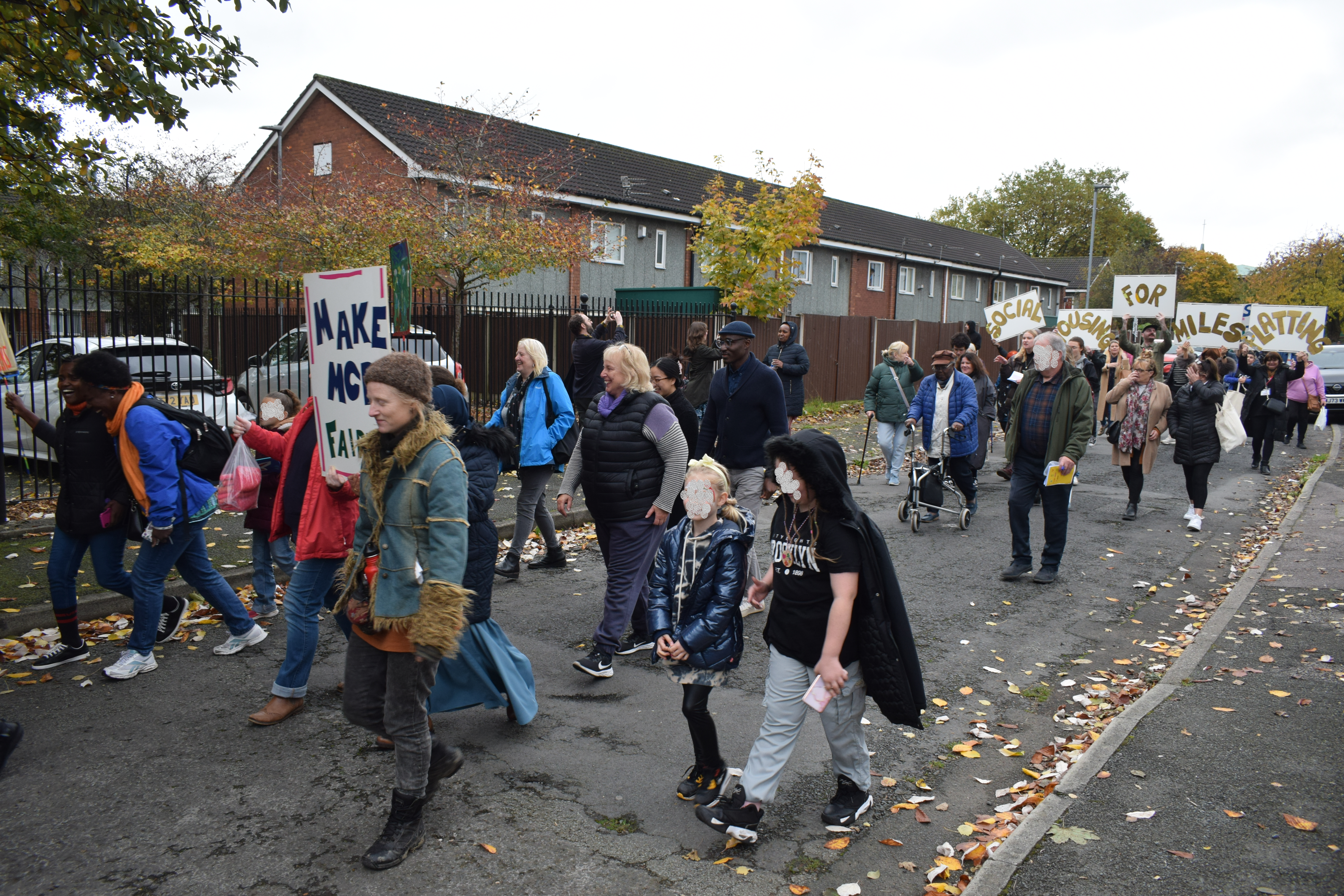
Miles Platting, Ancoats, and Collyhurst residents were out in force on Saturday to call for social homes to be built on a plot of land that has long been earmarked for community benefit.
Over 180 people attended the MPCAN family fun day where members also launched a city-wide campaign for more social homes to be built or brought into use across Manchester amidst a housing crisis in which more than 15,000 households are now on the waiting list for social housing in the city[1].
The Miles Platting PFI regeneration was justified to residents on the basis that there would be a Joint Services Centre providing a suite of NHS services and a Community Hub built at the intersection of Oldham Road and Varley Street behind the current location of Jigsaw Homes offices. This is the site where MPCAN leaders are calling for social homes to be constructed.

The Joint Services Centre was to include three GP practices; a pharmacy; chronic disease management, maternity and children’s health services; drugs misuse and sexual health services; counselling and therapy services; and breast screening and minor surgery. The Community Hub was supposed to incorporate: a new library; new sports facilities; advice and information; services for young people; spaces for community, recreation; and leisure use; and community outreach services.
There was also supposed to be retail facilities and a replacement swimming pool.
These facilities were never developed, and the community have experienced a net loss of 502 social homes following the regeneration (with 240 homes lost to demolition and others through right to buy). Meanwhile, the neighbourhood has been transformed into a landscape of private housing for sale and rent, with no shops or infrastructure to support this new population, creating a food desert, where residents must take two buses to access a supermarket or swimming pool.
Social Homes for Manchester Now!
As well as calling for social homes in Miles Platting, residents launched the Social Homes for Manchester Now! campaign by a coalition of social and climate justice organisations including Friends of the Earth Manchester, GM Tenants Union, Greater Together Manchester, Mustard Tree, Shelter, and Steady State Manchester.
The new spatial framework for Greater Manchester, Places for Everyone, is in the final stage of consultation on modifications which include the removal of specific reference to building social housing (in MM7.5). The new Local Plan for Manchester is being drafted and is expected to be published for consultation in Spring/Summer 2024. Together these policies will decide Manchester’s planning strategy and housing targets for the next 5-10 years.
Social Homes for Manchester Now! are calling on Manchester City Council to take on six key proposals in the context of these new strategic developments which were launched for the first time by Anne Worthington, MPCAN leader and local activist, on Saturday:
Social Homes for Manchester Now! – Six key proposals:
- At least 30% social homes to be included in all new developments of over 10 units to be enacted in local policy and enforced through the setting and enforcement of section 106 obligations.
- Stronger public accountability and scrutiny for the setting and enforcement of developer obligations to build new social housing.
- Establish a Commission on Social Housing for the City of Manchester.
- Create a specific policy for the promotion of Community Led Housing.
- Develop a practical strategy for the renovation/transfer of empty homes into homes for social rent.
- Ensure all new developments are climate and nature friendly.
Download the Social Homes For Manchester Now! briefing to find out how you can Get Involved in this campaign!
Respond to the Places for Everyone Modifications consultation to object to the removal of specific reference to Social Housing in modification MM7.5 here.
MPCAN leaders are now working with other Community Savers affiliates across the city to bring residents together around this campaign and the plots of land in their own neighbourhoods that require Social Homes Now!
[1] There were 14,912 households on the social housing waiting list in Manchester in 2022 and this figure is now likely to be significantly higher. Live tables on rents, lettings and tenancies, Table 600: numbers of households on local authorities’ housing waiting lists, found at https://www.gov.uk/government/statistical-data-sets/live-tables-on-rents-lettings-and-tenancies. We would like to thank Dr Richard Goulding, University of Sheffield, for his support to MPCAN in accessing statistics, research, and information.
Ageing Well in Place at Hopton Court: Achievements and challenges
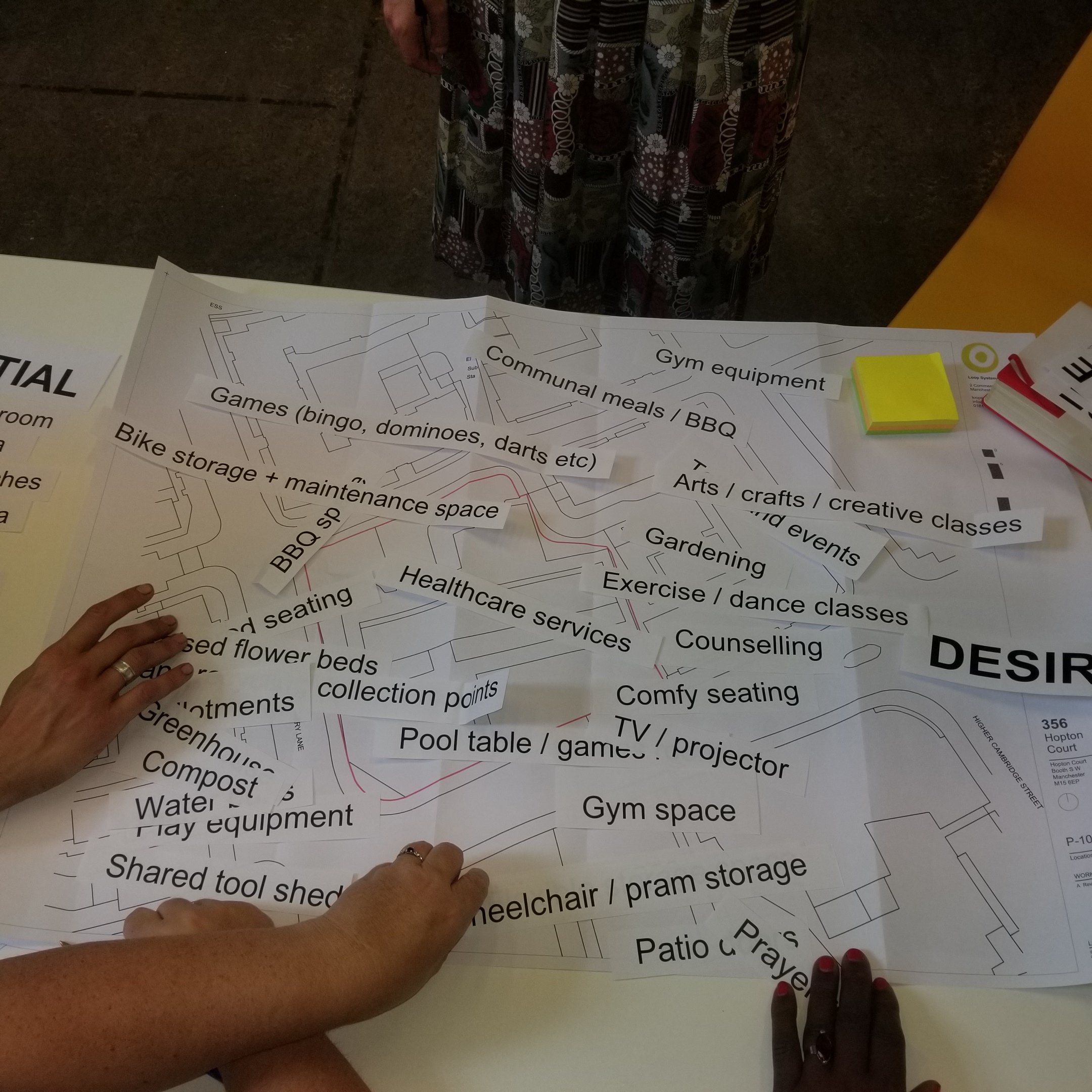
Tina Cribbin and Gill Edwards from Aquarius Community Savers reflect together on the rollercoaster ride of developing a pilot Naturally Occurring Retirement Community at Hopton Court tower block in Hulme, a video clip of Roy Bennett sharing achievements to date in April 2023 is also included.
Tina Cribbin:
“Cycles of HOPE, confusion, frustration, and anger, HOPE. Repeat. That’s been my experience of developing the Naturally Occurring Retirement Community (NORC) model in Hulme. Never in my life have I ever heard so many professionals play dumb, “I don’t know! “I will take that away”, “I was never made aware of that”. Or just tell lies: “there was never any agreement on that”, “we had to turn it around quickly so there was no time to consult”.
The NORC model improves the quality of life and wellbeing of older people in tower blocks reducing the need for older people to be moved into different accommodation in later life. This has been an issue I have campaigned on for years but got no joy. It originated in New York and has also been done in other parts of the US and Canada. New York has undergone gentrification on a huge scale for many years and the NORC model has proved successful in older people maintaining their homes and ageing well in place. This is the first time anyone has adapted it in the UK.
In 2019, we joined Community Savers and started working with CLASS. CLASS is a small charity which supports groups affiliated to the Community Savers network. CLASS is led by, for and with women leaders of the network. They worked with us to recognise how important our voices are and what we contribute to our community. They supported us in ensuring local people were not only privy to information but also that we were instrumental in decision making. CLASS is our ally and we have learned that it is near impossible to make change without working collectively. No matter how hard it is. It’s the only way forward.
We established a partnership called Ageing Well in Place in Hulme looking at the needs of older tower block tenants in our neighbourhood. We have undertaken community research, door knocking, BBQs, drop ins, workshops, taught at universities. We have undertaken community exchanges and some of us have been lucky enough to travel to Africa! Endless meetings, meetings, and more meetings…!

In March 2021, One Manchester agreed to work with us to adapt the NORC model for our tower block, Hopton Court. Think of the “batteries not included” film. Hopton is a bit like that.
My understanding of NORC is a way of working with older tenants living in tower blocks. Tower block living is quite isolating and tenants have a set of very unique issues which needs a flexible and responsive approach which is inclusive towards the community it sits in.
Bringing this concept to us and other professionals is difficult. Many were unsure exactly what the NORC is. Rightly so, it is complex because it is about co-production and not always pre-determining the outcomes – letting them come out of the partnership work. The NORC model is adaptable, flexible, with constantly shifting priorities that ebb and flow depending on need. Its messy but that reflects the real lives of the people and the community.
Working with partners at the two universities, One Manchester, CLASS, and tenants, the first urgent need that was agreed was for an Independent Living Advisor. Manchester Local Care Organisation and One Manchester provided the funding for her role as a pilot for a year. Katie had a huge impact on the Hopton community people were getting the right benefits (pension credits is one of the most underclaimed), aids and adaptations, repairs in the block were now being delivered promptly, health and care workers were able to access their patients. Older people’s lives were being transformed. Unfortunately, a major restructure at One Manchester meant there was no-one leading on the project for six months and they missed the opportunity to apply for further funding for her role. She had her contract terminated after a year. What a bitter blow – the tenants were devastated.
We are still negotiating for One Manchester to fundraise through our partnership to finance a new Independent Living Adviser role but we have lost Katie now and all the relationships of trust she built up over a whole year of working with the tenants.
We have learned that no matter what they throw at us WE FIGHT BACK. We are a community under siege (on the edge of Manchester city centre and two constantly expanding universities) and understand how difficult it is to live with constant pressure. We’ve learned that pressure works both ways.
We now have a NORC development worker and community researcher who work at the block ensuring that the project is rolled out in partnership with tenants and ensuring decisions are informed by tenants. They have already undertaken research with tenants to determine the design and uses of our new community space. They are improving the lives of older people by holding weekly activities and providing support. Since they became employed, there is definitely a renewed energy about the place.
At times I got so lost in meetings, workshops, partnership agreements, I lost sight of why I was doing it.
I returned to Hopton every day and seeing the changes big and small keeps me grounded.
For anyone thinking about working in tower blocks: Just do it! All of this sounds so huge. But we started with a cup of tea. And that still remains one of the most important things we do. Being beside people combating isolation a brew at a time.
People think that you have to start at the top getting written agreements and permission: you don’t! Its why it’s worked in Hopton – as it comes from the ground up. We didn’t ask permission to start. We just did. The biggest thing I have learned is that PEOPLE DON’T GIVE YOU POWER, YOU TAKE IT.
My amazing sister Activist Gillian Edwards will share her thoughts on the community space.”
Gill Edwards:
“Yay we got the community space!”
“We have been through so many ups and downs with regards to the community space. We started out doing some research looking at what was happening to tenants at the block. There was so much isolation and people falling through the gaps in services. A new community building was one of our first priorities when CLASS supported us to get a ta dialogue going with our housing provider One Manchester.
Over the last three years there have been many obstacles to overcome. The first being to come to the agreement for the need for a community space and what form it should take. In 2021, we agreed to co-design a new purpose-built community building which would be installed in a corner of our shared gardens at Hopton Court. We agreed that tenants and the Ageing Well partnership would use the designs to raise money for the construction as long as there were no problems with feasibility.
We worked together with Manchester School of Architecture to get some ideas about what the community space could look like and we also undertook a survey of Hopton Court to find out what the residents wanted. We had over 50% of tenants complete the survey which was presented to One Manchester.
They agreed for us to go ahead and contract an architectural practice to work with us to get the design phase through to planning permission or “ready to construct” stage – we invested £16,000 of our own Lottery resources that we had through Community Savers to do this. The architects worked with all the tenants to co-design the new building and get all the ground surveys done ready to submit proposals to planning.

Everyone was so excited. Then a bombshell dropped when some of the staff we were working with left through a big restructure and One Manchester suddenly said they would not support the new building!
The heart had been ripped out of the residents of Hopton Court, but we kept up the fight and they have agreed to renovate a 3-bedroom ground floor flat into an alternative community space.
We have had to do all the surveys and consultations over again to get tenants views on what they would like to see in the space, but it is finally due to open in November of this year.
We have achieved a great deal but we have won the battle not won the war: the future is still uncertain. We have many obstacles to overcome as One Manchester have still not agreed a clear investment plan or project plan for the NORC pilot and our Community Development Worker started in post nearly a year ago. But we will keep up the fight because are a community that has a right to be here, a right to services, and a right to be heard. Our community has lost so much due to university expansion and ‘regeneration’ but we are not going to be forgotten or swallowed up. We will not give in or give up! We are Hulme!
Watch Roy Bennett sharing some of Hopton’s achievements in April 2023:
“Our achievements include:
- Hopton Court being designated an Over-50s block.
- An Independent Living Adviser supporting elderly and vulnerable tenants through one-to-one case work for 12 months.
- Replacement of our lifts and ensuring lifts stop on every floor (work to commence this year).
- A new ground floor tenant-managed community space.
- A new Community Development Worker in post who is working in partnership with us to make Ageing Well in Place at Hopton Court a reality including social events, gardening, and developing connections and partnerships with local services.
- Successfully opposing proposals for an 11-storey purpose built student accommodation block that a developer wants to construct right opposite our gardens which would block all our sunlight and put huge pressure on our local services which are already on their knees.
That struggle is not over but by working together through the Block the Block campaign and with all our supporters we will keep up the fight. We are still here with the strength of will and courage of a unified voice to stand up and say no. Our community is what has made us and what we will stand up for. We will not be beaten into submission by big corporations.
Do not underestimate the power of your communities and the voice you have as a collective. Anyone can achieve great things as a community so use what was given to you to improve yours!”
“You have the power!“
Manctopia: Reality TV in a journalism jumper*
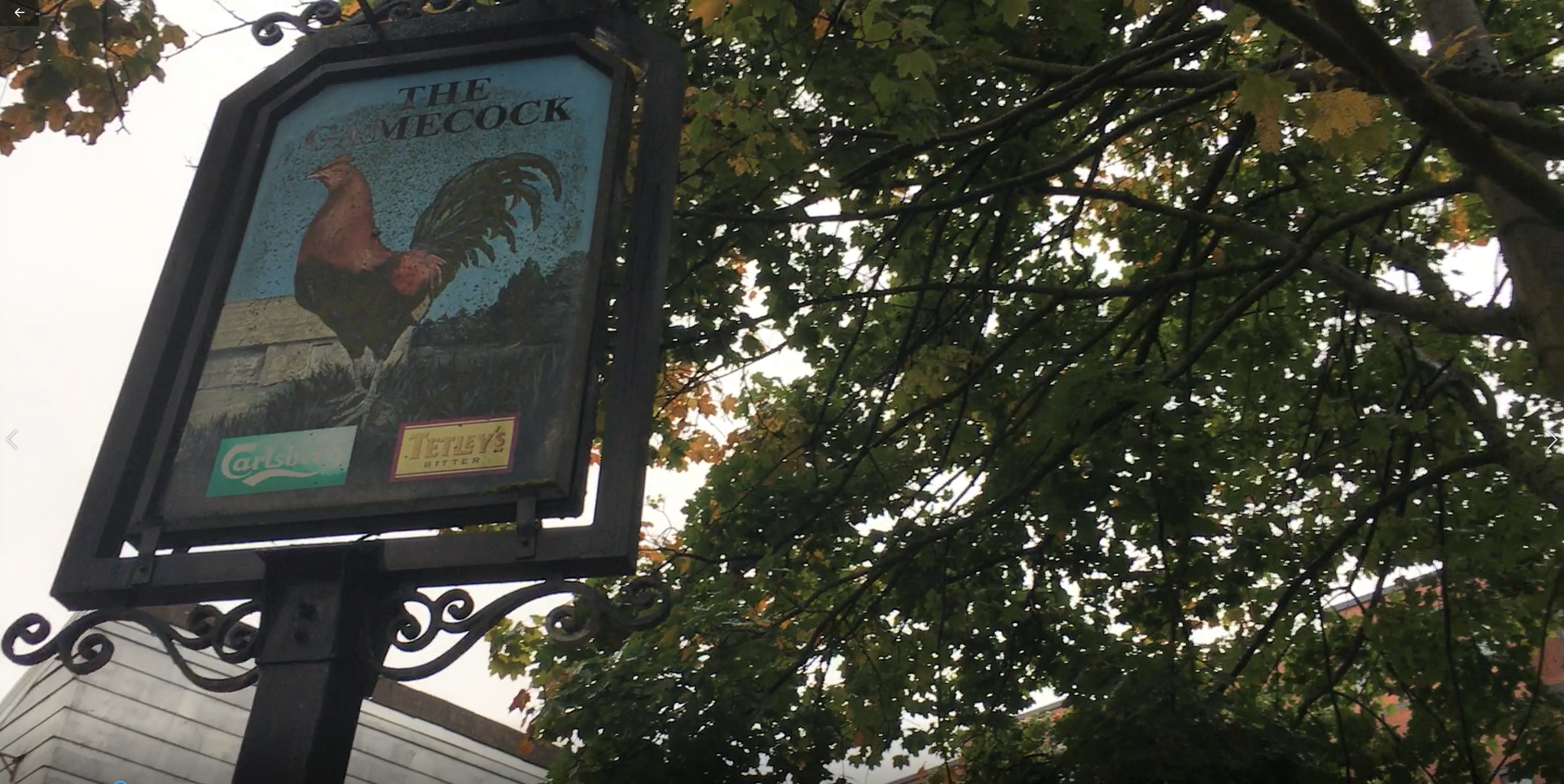
“We want Manchester to be this cosmopolitan city…but at what cost?” Judith from Lifeshare in the trailer for Manctopia
The series trailer and episode lead-ins for this 4-part BBC Two documentary that concluded on Tuesday evening are suggestive of a series seeking to analyse the inequalities associated with Manchester’s “property boom”. Instead, this glossy reality TV entrenches a misguided message that uncontrolled investor-driven urban development is the only possible trajectory. Its winners vs losers framing negatively impacts those communities experiencing the pressures of gentrification on a daily basis.
Greater Manchester Savers have contacted the BBC today about their concerns regarding the Minnow Films production ‘Manctopia’. Many tuned into the programme hoping to see some serious national journalism interrogating the underlying issues that are increasingly fragmenting communities, displacing people to outer areas of the city-region and beyond, and ultimately costing lives on the streets and through a mental health crisis.
This is not what they received. This article attempts to give voice to some of the key concerns and responses of members of inner city savings groups and their networks.
Throughout the series the audience is presented with a version of reality where investor-led urban development is the only available option for local and national government and society more widely. There is no analysis of what alternative strategies a city like Manchester can decide to pursue or of any of the challenges that may be present in the approach that has been taken to date. There is no discussion for example of Planning Obligations which provide an under-enforced mechanism through which local authorities can ensure that communities are compensated for developments and that negative impacts are mitigated. Neither is there any discussion of approaches that have been taken in other cities to avoid the profits from development being extracted out of the city instead of being made to work for the social welfare of people and communities most in need of support.
In episode three, some airtime is given to Mayor of Salford Paul Dennett who is at pains to stress the urgency for new build housing and that the City of Salford and the Greater Manchester Combined Authority have a vision for affordable housing. However, at no point is there any breaking down of what ‘affordable housing’ means in practice even when Paul Dennett tries to bring this out by talking about ‘genuinely’ affordable housing. In reality, the term is used to refer to three different types of housing provision: shared ownership, affordable rents (set at 80% of market rent), and social rent (which works out at approximately 60% of market rent). For many existing residents of the communities featured in the programme, only social rented accommodation is affordable.
Here, some of the members of the GM Savers network share their responses to the programme in person:
Tina Cribbin in Hulme talks about stigmatisation, the absence of alternative strategies presented, and the poor diversity of experience covered by the programme.
Roy Bennett in Hulme wishes the programme could have looked at the way that development happens without any plans being made for how to protect sufficient land for community facilities and appropriate housing for older people:
Sue, Dot and Christine in Miles Platting and Collyhurst discuss how the programme failed to represent the experiences and needs of households and families like theirs currently living in social housing or to educate us about the reasons for so much housing becoming privatised and unaffordable.
Thelma McGrail, who appears in the programme briefly, is concerned about having been provided with a misleading explanation of what the programme was going to be about, and the stigmatising portrayal of the Miles Platting community during the programme.
Ellie Trimble, local resident and Church of England Rector in Miles Platting, who was engaged by the programme makers but became worried about their approach, shares her concerns about the unrepresentative and simplistic presentation of homelessness and temporary accommodation.
People have shared how important it was that Anne and Donna and other local residents were able to raise the profile of experiences on the Osborne estate under the Northern Gateway regeneration process in the final episode. However, Greater Manchester Savers feel that ultimately, there was inadequate analysis of the local, national and international factors that are shaping the current housing crisis and resulting in people being displaced from the city. Some history was featured but without any unpacking of the reasons behind those histories. The community leaders who have commented feel that the repeated presentation of various (sometimes deeply offensive) individual perspectives, with no qualification or discussion, when dealing with issues of such critical importance to people’s physical and mental wellbeing, is unacceptable. They feel most strikingly that disproportionate airtime has been given to the perspective of a single millionaire developer and a number of unrepresentative caricature features such as that on the wealthy fashion designer who needs extra bedrooms for her shoes.
At a time of national crisis, when the effects of ten years of austerity policies have combined with an as yet uncontrolled pandemic to exacerbate poverty and health inequalities in some of the most hard-hit communities in the city (and the country), Greater Manchester Savers consider the airing of this series to have been misjudged and the nature of its directorial narrative to be misleading and unrepresentative. The suggestion that the main focus of the programme may not have been properly and clearly explained to some of the individuals interviewed (see Thelma’s contribution) is also concerning.
In their editorial guidelines, the BBC commits to:
- covering subject matter in such a way ‘so that no significant strand of thought is under-represented or omitted’
- ‘always scrutinise arguments, question consensus and hold power to account with consistency and due impartiality’
- ‘offering our audiences choices about how to confront’ [the issues they are covering within their programming]
Greater Manchester Savers question whether these guidelines have been adhered to in the making of Manctopia.
*‘Capitalists in Anarchist Jumpers’ is a poem by Tina Cribbin published in her 2019 collection Classphemy. This article has been written by Sophie King at CLASS in consultation with, and on behalf of, members of GM Savers and their local networks in response to concerns they have raised about the programme.
Its the little wins

Tina Cribbin celebrates recent achievements of local residents and members of On Top of the World in Hulme.
In our tower block there was always a sense of hopelessness with the tenants just having given up after years of making no impact upon where they lived no matter how they approached. An example: it took three years to get a bench for residents to sit on. When I think back to all the energy that took!
But after On Top of the World and CLASS began to work together we work differently. We have had lots of little wins like new benches, mobility charging points, support for our digital inclusion work, and now we are developing a partnership with our housing provider One Manchester to look at ways to provide supported accommodation for older people in Hulme. I realised the importance of where you take your concerns and how to negotiate – someone at CLASS said, sometimes, we have to create a space for professionals to help us. It’s really stayed with me because previously I would have just blamed the professional for not listening to us and giving us a hard time. These little nuggets are the things I’m soaking up for myself and, more importantly, for my community.
Recently we had a meeting with the Director of Place at One Manchester about supported accommodation and we mentioned the laundry facility in the block being closed and how this impacted on the tenants. She was quite open with us as we now have built a relationship.
The other day, Jack who is 81 came to me smiling – ‘well Tina’, he says, ‘the laundry rooms now open’. I said that’s great. Then he said ‘in our next meeting, what we must do next, is make sure we get a new washing machine!’
This may not seem much but after working with these guys for over three years it is the first time they felt that had the power to make an impact. And the belief that his voice will be heard. How do you measure that?
Since we started up our savings group, I’ve also been able to buy myself a new sofa – it’s the first time in my life I’ve ever bought a sofa new – it’s like I said in our ‘story so far’ report – I was never taught how to manage money because we never had any.
If I could sum up the benefits of working with CLASS as a member of the Greater Manchester Savers network, this would be it…
Change and giving voice to the voiceless.
